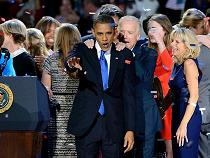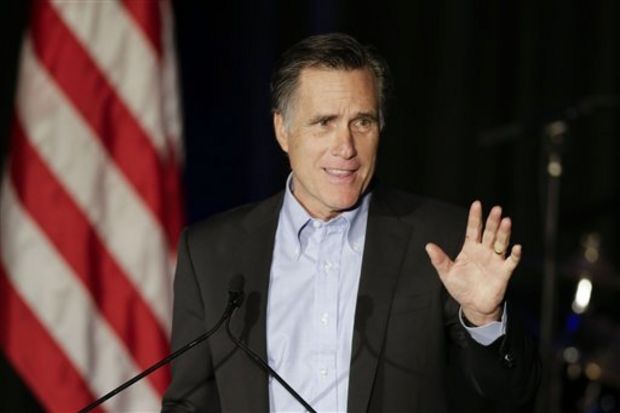
From Media Reports
By all accounts, Americans turned out in record numbers last night in a clear statement that this was an election that mattered.

And while President Obama didn’t win the popular vote, he easily surpassed the 270 electoral votes that he needed – gaining 303 – for another four years as the nation’s Commander-In-Chief.
Obama appeared before thousands of cheering Democrats in Chicago to the beat of Stevie Wonder's “Signed, Sealed and Delivered” after securing a strong electoral lead, although he just eked out victories in key states, ABC News reported.
Obama promised his thrilled supporters “that for the United States of America the best is yet to come.”
He congratulated his opponent Mitt Romney and said, “In the weeks ahead I am looking forward to sitting down with Gov. Romney to discuss how we can move this country forward.”
In a victory speech studded with the soaring rhetoric that first drew voters to him in 2008, Obama reminded the electorate what was still on his agenda — immigration reform, climate change and job creation.
“Tonight, you voted for action not politics as usual.” he told supporters in Chicago. “You elected us to focus on your job, not ours.”
Obama told Romney supporters that “I have listened to you… you have made me a better president.”
He added, “I return to the White House more determined, more inspired than ever.”
The election is a validation, if not an overwhelming mandate, in support of the president's policies of the last four years, which included a major overhaul of the healthcare system and a drawdown of troops in Iraq and Afghanistan.
Obama built a coalition of young people, minorities, and college educated women and won by turning out supporters with a carefully calibrated ground operation to get out the vote in crucial states like Ohio, Iowa and Wisconsin.
He thanked those who voted “whether you voted for very first time, or waited in line for a very long time — by the way we have to fix that,” he joked.
He thanked Vice President Joe Biden, whom he called “America's best happy warrior” and first lady Michelle Obama.
“Sasha and Malia,” he said addressing his two daughters. “You're growing up to be two strong, smart, beautiful young women…I'm so proud of you. But I will say for now, one dog is probably enough,” he said riffing on his promise of a puppy four years ago.
Prior to the president's speech, Mitt Romney conceded gracefully in Boston.
“I so wish that I had been able to fufill your hopes….but the nation chose another leader,” Romney told heart broken supporters at his Boston headquarters.
“I pray the president will be successful in guiding our nation,” Romney said before running mate Rep. Paul Ryan of Wisconsin and their families joined Romney on the podium.
Obama's lease on the White House was renewed with a crucial victory in Ohio.
Celebrations erupted in Obama's home town of Chicago, in New York's Time Square and outside the White House, while Romney's Boston headquarters went mournfully quiet.
“We're all in this together. That's how we campaigned, and that's who we are. Thank you,” Obama tweeted even before formally announcing his victory.
Nevertheless, it was a squeaker. In Florida and Virginia, states that were key to both candidates, Obama and Romney were separated by a single percentage point. Ohio also was close, with the candidates also separated by a point late into the vote count. And the popular vote was nearly split evenly down the middle nationally.
With counting still going on and before Florida had been called, Obama led with a significant electoral lead, 303 votes 203.
After a campaign for the White House and both houses of Congress that cost more than $6 billion, the make up of all three branches remains very much the same as it was before the election. Obama remains in the White House, Democrats retain control of the Senate and Republicans continue to control the House.
Early on, the Obama campaign built an electoral firewall across the Midwest, focusing on Ohio, whose 18 electoral votes strategists saw as vital pathway to victory, and it was Ohio that secured the president's victory.
Before the Republicans had settled on a nominee, Obama was running ads in the state's blue-collar North. That effort paid off for the president, Ohio voters said they supported his bailout of auto manufacturers, an industry vital to the states economy, 59 percent to 36 percent.
The participants were themselves history making, the first black president running against the first Mormon presidential nominee to make it the general election. But for the most part the election turned not the politics of identity but of the economy.
The election took place against the backdrop of a slow economic recovery. From its outset, both campaigns knew the race would come down to the economy, and both tried to tailor their appeals to middle class families struggling with inflation and unemployment.
Obama routinely reminded voters he had inherited the worst economy since the Great Depression and pointed to policies he led, including the auto bailout, and signs of improvement including a drop in the unemployment rate.
Obama portrayed Romney as an out of touch millionaire intent on helping the rich at the expense of the middle class when they were hurting the most. That impression seemed to stick with voters who nationally said by 55 to 40 percent that they believed the economic system favors the wealthy rather than being fair to most people, according to exit polls.
The candidates also tangled over health care, abortion, and taxes, leading to a bevy of negative ads.
The campaign was the most expensive in history, with each candidate raising nearly $1 billion a piece.



